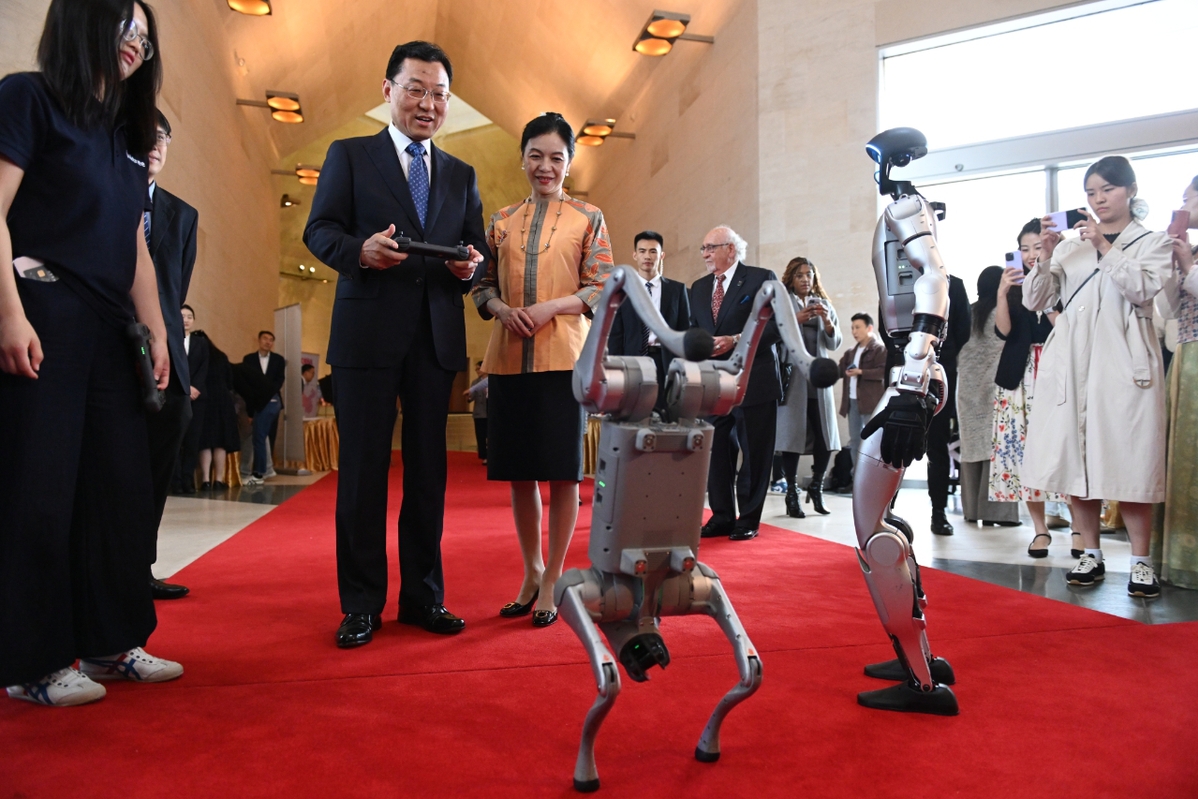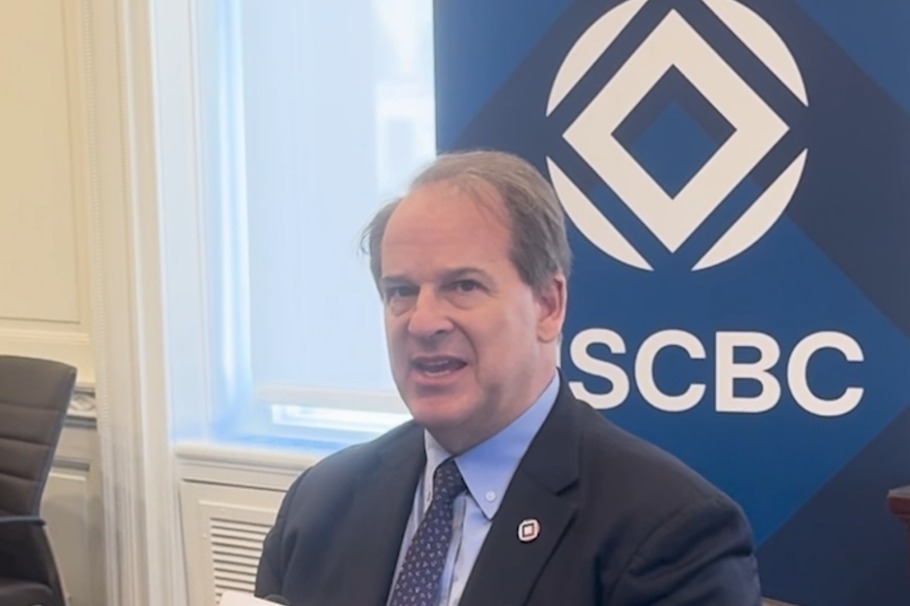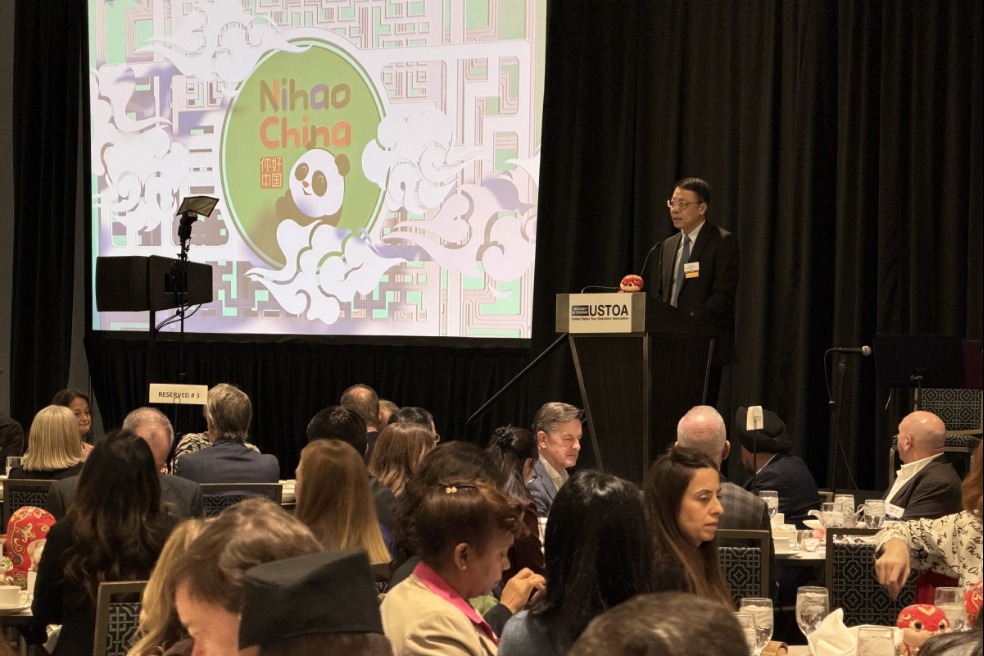Following their 'Footprints'


China and the United States each have strengths in science and technology, and the right path forward is mutual learning and cooperation for shared success, Beijing's top envoy in Washington said on Wednesday, as the US announced new curbs on tech exports.
"Blockades never prevent breakthroughs; churning waves won't hold back determined ships," Ambassador Xie Feng said at the premiere of the documentary My China Album - My China Footprints and the Glimpses of Modern China show.
The event celebrated the sixth edition of "My China Album", an annual initiative co-hosted by the embassy and China Daily, featuring personal stories, short films and interactive exhibits that explore Americans' experiences in China.
Washington ordered a broad swath of companies to stop shipping goods — including design software, machine tools and aviation equipment — to China without a license and revoked licenses already granted to certain suppliers, Reuters reported on Wednesday.
The new restrictions followed earlier US guidelines seeking to globally restrict the use of Chinese advanced computing chips.
In a rare showcase in Washington of China's robotics technology, a 1.3-meter-tall humanoid robot, developed by Chinese tech company Unitree Robotics, invited Xie to the stage at the start of Wednesday's event at the embassy.
"So cute. I never thought that I would be invited on stage, you know, by a robot. So who knows, maybe one day it will be the one standing here giving the speech," Xie quipped.
He noted China's pursuit of innovation is not to oppose or out-compete anyone, but for better lives of its own people and greater development of humanity.
"A big yard with iron curtains only leads to isolation; blocking other countries slows global innovation; and weaponizing scientific collaboration harms one's own credibility and weakens competitiveness," Xie said, without mentioning any of the fresh US curbs.
But he did recall the past feats the two countries made in science and tech exchange. They include joint efforts to promote folic acid intake that helped millions of newborns, and helping African countries curb the spread of Ebola.
Most recently, China shared lunar soil samples from the Chang'e 5 mission with Brown University and Stony Brook University.
In his speech, Xie noted that China is using technology to improve lives at home and around the world.
He highlighted China's advances in green development and technology, noting that more than 87 percent of days in China last year had good air quality, and the country created one-quarter of the world's new green spaces.
China also has built the world's largest renewable energy system, employing nearly half of the global workforce in the sector. Its solar and wind products are exported to over 200 countries, helping cut global carbon emissions by more than 3.6 billion tons.
Xie also pointed to DeepSeek, an open-source AI model, as an example of China's openness and contribution to global progress, offering hope for bridging the digital divide in the Global South.
The ambassador also said that it is people-to-people ties that invigorate China-US relations.
"The future of this relationship ultimately depends on the two peoples. We warmly welcome more American friends to travel in China, shop in China, succeed in China and take part in Chinese modernization," he said.
In addition to the feature-length documentary My China Footprints, Wednesday's event featured four short films, telling stories that are diverse, yet unified by a common thread — the powerful impact of people-to-people exchange.
In My City, My Home, the audience met Charles Stone, a lawyer who discovered tranquility and safety in Shenzhen, and Neil Schmid, a researcher deeply engaged with the ancient Buddhist art of Dunhuang.
Welcome to the Future took viewers on a journey through China's technological achievements — from the speed of sleek bullet trains to the everyday convenience of QR code payments — as seen by students like Ruthie Fike and content creators like BeeRose.
Meanwhile, Misconceptions vs. Reality offered a refreshing counter-narrative to common stereotypes. It followed Dustin Madison, who was surprised to find Shenzhen especially welcoming for families, and Katherine Loraine Olson, who explored the country's abundant green spaces.
The final short film, City or Not City, documented the whirlwind travels of Thelma Lancaster and Evan Kail, who made full use of China's extended 240-hour visa-free transit policy to explore Beijing and Tianjin, immersing themselves in the culture despite a brief visit.
"These stories matter because they remind us of what's possible. Yes, tensions exist in China-US relations — trade disputes and the technology barriers created by the US dominate news headlines — but cooperation and friendship remain the bigger story," Qu Yingpu, publisher and editor-in-chief of China Daily, said in a video speech.
Citing President Xi Jinping's remarks that "the hope of the China-US relationship lies in the people, its foundation is in our societies, its future depends on the youth, and its vitality comes from exchanges at subnational levels", Qu said that projects like "My China Album" prove it.
"From Bill Einreinhofer, who is at the event today, sharing his Emmy-winning insights, to tech firms like Rokid showcasing innovation, tonight's event reflects that vitality," Qu said. "China Daily is proud to amplify these voices, showing a real, vibrant China to America."
More than 200 people, including Americans from all walks of life, attended the event.
In the Glimpses of Modern China show, participants were wowed by a dancing robot dog from Unitree, which can walk on two legs or shake hands with visitors, and a robot, which can do Chinese kung fu but also help people with fire detection and 24-hour security checks.
At the demonstration site of Rokid, a Hangzhou-based AR (augmented reality) glasses maker, Spanish and English-speaking visitors found that they had no difficulty talking with the Rokid staffers, who spoke Chinese with them.
The AI-powered glasses can translate more than 100 languages in real time.
































